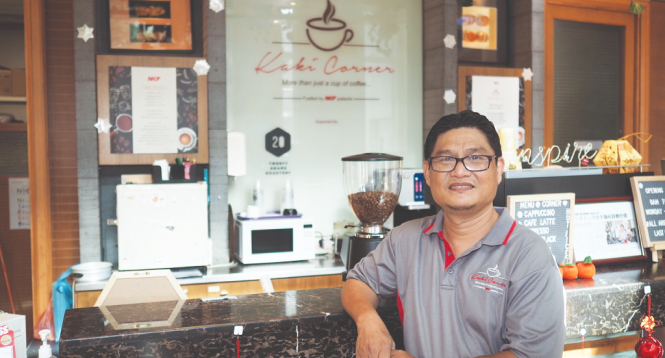
Mr John Khang, 51, was diagnosed with kidney failure in 2014 and could not lift heavy objects because of his swollen feet. He was then forced to close down his repair shop. Here, he shares with us his difficult journey after being diagnosed with this debilitating illness and how, by receiving training as a barista through NKF’s patient employment programme, he has gotten back on his feet and looks towards the future positively.
In my younger days, I ate a lot of fast food, did not watch my salt intake and disliked eating vegetables. As early as my 20s, I already had high blood pressure. When I was struck down with kidney failure, I felt dejected and was at a loss as to what to do. My first thoughts were one of pain and fear. When I was on dialysis, breathing was harder, and I experienced cramps at the start of dialysis, as my body needed time to adjust. I easily lost my temper with my wife and daughter. The diagnosis also affected my family’s emotions as everyone got more uptight, especially as I could not find work easily and contribute to the family. Our frustrations kept piling up.
“I encourage other patients to be independent and be empowered to go out and find a job. When you contribute to society, you will have a sense of self-worth.”
– Mr John Khang, who is benefitting from NKF’s employment programme
My struggles to earn a living
I had to shut down my repair shop business which I ran for six years and took up part-time jobs. I was under great pressure at that time and sought counselling from a psychologist. What was most unbearable to me was the gossip from colleagues who did not understand that I had to leave work early for dialysis – they questioned why I did not have to do the menial work of moving goods when everyone was getting the same salary. Since I was earning much lesser working part-time, my financial situation was affected. My wife had to shoulder the burden as the main breadwinner. I am grateful for the subsidised dialysis treatment from NKF which helped ease my financial burden greatly.
Realising my self-worth
I slowly began to adapt to my health condition and became a patient advocate, where I had the chance to interact with other patients. I even sang and performed for other patients during such sessions at the dialysis centres.
One day, when I was at the NKF headquarters, I noticed patient baristas at the lobby brewing coffee at Kaki Corner and it got me interested. I asked one of them whether I could join and subsequently applied for it. I went through the training and started working there since last year.
My fellow patient baristas and I will share with one another about what to eat before dialysis, and which part of the dialysis procedure is more painful and how to cope with it – these are all topics that I have struggled to talk about in other jobs previously. Now I look forward to communicating with colleagues who share the same experiences every time I go to work. My mental burden has lightened, and my family can set their mind at ease in letting me come out to work. I recently completed 100 hours of internship at Kong Café under Kaki Corner’s training programme to improve my barista and customer service skills. They have since employed me on a part-time basis.
Taking each day as it comes
Nowadays, I spend much of my free time with my family like watching movies at home or bringing my daughter out to eat. I had also taken English classes to improve my English as well as baking classes. I encourage other patients to be independent and be empowered to go out and find a job. When you contribute to society, you will have a sense of self-worth. I treasure each day to its fullest.”
|
Empowering patients through employment programme Since the recruitment of the first batch of patient employees for the programme last November, 15 patients have joined the programme and received professional barista and food hygiene training.These patients will first accumulate at least 20 hours of work at Kaki Corner, with their wages being funded by NKF. After which, they will get to intern at a local café that has partnered with NKF for about 100 hours. The patient can then decide whether to return to work at Kaki Corner or stay on at the partner café if there is a job opening. NKF currently partners with eight cafés. By doing so, it hopes to improve employers’ understanding of dialysis patients through such collaboration and help more patients become self-reliant. To recruit more patients, social workers of each dialysis centre will look out for patients who are willing to work, and then the team overseeing Kaki Corner will assess the patients’ ability, so as to ensure that they do not have problems like severe dizziness or trembling hands. |





